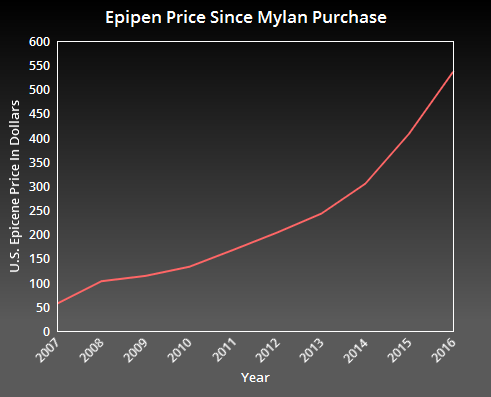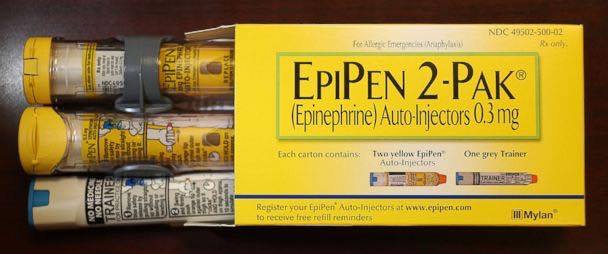For all the mortals out in the world, modern medicine is often the difference between life and death. Whether it’s treatment for a case of AIDS or a reaction to a bee sting, almost everyone has taken some pill or injected something into their bodies before. In many countries in the developed world, medical treatment is provided to everyone. But in the U.S., there is only one rule: You can’t be poor. If you’re poor and struggling to get food on the table, your chances of getting the best medical attention are slim to none.
Pharmaceutical companies have been steadily increasing the prices of prescription drugs since 2007, and the newest company to join in on the price gouging is Mylan. Mylan is one of the largest generic drug companies in the world, and they acquired the rights to make Epipens in 2007. According to The Atlantic over 40 million Americans have severe allergies, and these individuals need to carry Epipens to inject in their thighs in the event of anaphylactic shock. When someone is having a severe allergic reaction the muscles in his or her throat tense and close. Adrenaline causes those muscles to relax for a period of time, buying that person precious time for the paramedics to come. Mylan has increased the price of this life-saving drug from $100 to over $600 in just seven years.

The way that many people in America pay for their medication is through insurance. Now, the cost of an Epipen is often paid for by the insurance company, but unfortunately only the better and more expensive plans cover the bulk of the cost. Consequently most Americans can’t afford the best insurance and have to settle for high-deductible, high copay 99 cent store insurance which barely, if at all, covers Epipens. This is causing millions of Americans to forgo purchasing new Epipens, taking a chance on using an expired Epipen and running the risk of it being ineffective, potentially resulting in death.
Mylan is blaming the insurance companies for not covering the costs of Epipens, and insurers are blaming Mylan for making the product exceedingly costly to provide. This question was proposed to a few Monta Vista students and most claimed that both parties should shoulder some blame. Junior Nikash Khanna, a student who has used Epipens multiple times, states his opinion.
“While insurers should cover the costs of Epipens, no company should increase the cost of a life-saving product just for an increase in salary,” Khanna said.
Even though Monta Vista is in a well-off area, many students still feel the effects of Mylan’s thoughtless pricing. Junior Priyanka Sujan, who has had severe allergies to most nuts from birth, explains her concern.
“There was a point in time when I had to use up to two [Epipens] a year,” Sujan said, “And now I know I’m going to have to be much more careful. I don’t want to spend a $1,000 on Epipens.”
One of the reasons Mylan was able to increase the price dramatically is the lack of competition in the Epipen space. Until 2014 Mylan had a competitor Auvi-Q, they made a similar adrenaline injector at a relatively lower price point than the Epipen. But in 2014 the FDA recalled all Auvi-Q injectors because of a defect causing it to dispense an inaccurate dose. Enabling Mylan it increased their prices at a whim. With no fear of people turning to the more reasonably priced Auvi-Q. There have been attempts made by other companies to make a competing product, but the FDA has yet to approve any, giving Mylan a virtual monopoly, letting them tinker with the price as they wish.
Another factor contributing to the dramatic price increase is caused by U.S. policy regarding drugs. The U.S. doesn’t have any regulations on the prices of medicine. Since the U.S. relies on the age old free market to dictate the price of its pharmaceuticals. There is one big issue with this methodology: People can’t negotiate price on something that can save lives. People depend on Epipens. You can’t stop buying them if they get too expensive, as you could with a car or computer. And Mylan knows this, so they can charge whatever price they want knowing that people will never stop buying their product.
To see only, one possible solution, one only has to go and look north of the border, at Canada. Canada has price regulations on all life-saving drugs, and consequently the price of an Epipen is still around $100. The price regulation allows the medication to be available for practically everyone.
But unfortunately this will never work in the U.S. since the moment anyone says the word “regulation,” all the free market capitalists come out of the woodwork, and more often than not, shoot the idea down. The only way the problem can get solved, in the U.S. at least, is through massive public outrage or a competitor that is willing to charge less. Unless this issue is addressed, the price of prescription drugs will continue to rise and, people still are unable to afford them the body count will only continue.










